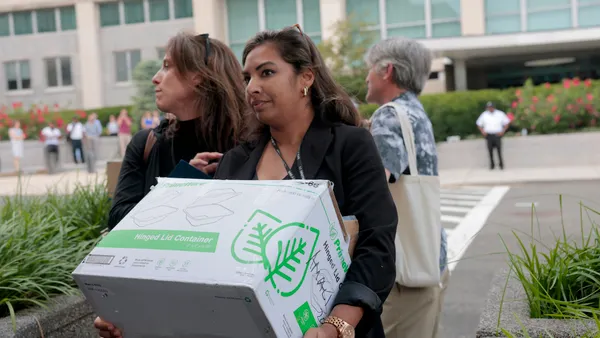Editor's note: This article was originally published in American City & County, which has merged with Smart Cities Dive to bring you expanded coverage of city innovation and local government. For the latest in smart city news, explore Smart Cities Dive or sign up for our newsletter.
Partnering with a cooperative purchasing organization gives agencies streamlined access to disaster preparedness and relief contracts. Contracts provide an opportunity to pre-identify suppliers who can quickly respond to and adapt to requests.
Follow along as we share how procurement can be calm amidst the storm with smart pre-incident planning.
"Schools and municipalities should have contracts in place for just-in-case situations," said Jessica Goforth, Vice President of Public Sector Contracting. "In an emergency, there will likely be supply shortages along with staffing and pricing challenges. On-call contracts give agencies priority access."
Response When You Need It Most
Incorporating compliant contracts into your emergency plans can relieve some of the uncertainty of trying to source supplies and services during a fluid emergency situation. National suppliers can pre-position resources in anticipation of a disaster and provide valuable pre-incident expertise. During recovery, they can assess inventory positions, large order support, expedite transportation and offer on-site emergency operations center support.
Procurement and Emergency Planning Must Work Together
Most local governments and school districts have emergency operation plans (EOPs) in place. Successful plans focus on coordination and unity of purpose across a wide range of stakeholders. Procurement professionals are vital team members who ensure the right supplies get to the right place at the right time.
Emergency plans don’t have to start from scratch. The Federal Emergency Management Agency (FEMA) website has downloadable planning guides. These documents encompass everything from large municipalities to small nonprofits. Colleges and Universities have access to specialized planning guides through the FEMA Ready Campus Program.
Disasters can shut down computer servers and cut off office access. Remember to keep at least one hard copy of your EOP in an off-site location.
Mature emergency planners understand you can’t plan for every uncertainty, but no plan at all is destined to fail. Agencies who are flexible and learn to coordinate with outside help are better able to adapt to the complexities inherent with any disaster. Experienced response teams at the national, state and supplier level are invaluable resources during unpredictable times.
Portfolio Offerings
The OMNIA Partners portfolio of competitively solicited and publicly awarded cooperative contracts provides state and local governments, higher education, K-12, and nonprofit organizations access to thousands of solutions. Having contracts at the ready for supplies, services, logistics and expertise is a crucial step in bringing calm to the chaos.
Cooperative purchasing agreements with OMNIA Partners include the following:
- Disaster Restoration of Operational Services
- Modular Buildings
- Portable Storage
- Electrical, Lighting & Data Communications
- MRO Supplies
- Equipment Rentals & Related Products
- Roofing Supplies & Services
- Risk Preparedness & Claims Recovery Services
- Non-Disaster Restoration of Operational Services
- HVAC Products, Installation & Services
- Technology Products, Services & Solutions
Download OMNIA Partners’ Disaster Preparedness Whitepaper: The Three P’s of Disaster Preparedness
About the Author
www.omniapartners.com








